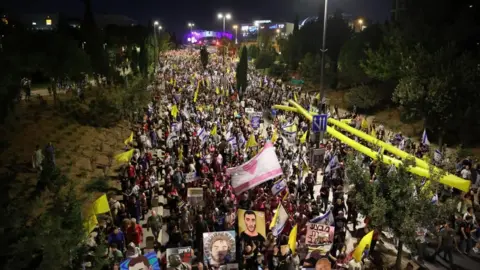In a historic turn of events, the United States has directly targeted Iran's nuclear facilities with military strikes, marking a significant escalation in a long-avoided military confrontation between the two nations. This definitive action by the current US president, who once advocated for peace, has sent shockwaves across the globe, raising questions about Iran’s potential response and the future of diplomatic relations.
The backdrop of this confrontation involves the 86-year-old Ayatollah Ali Khamenei, Iran’s supreme leader, who is now reported to be in hiding, facing immense pressure to act. Analysts warn that Khamenei’s forthcoming decisions could shape not only his legacy but also the fate of the Islamic Republic itself. Sanam Vakil from Chatham House emphasizes the gravity of the situation, suggesting that any miscalculation on Khamenei's part could have devastating consequences.
Retaliation seems imminent, as the Islamic Revolutionary Guard Corps (IRGC) has vowed that the US will experience "lasting regret" for its actions. However, expert opinions suggest Iran may be reluctant to engage in open warfare, as the repercussions could be catastrophic. As Hamidreza Aziz noted, despite fervent calls for retaliation, Iran's leadership realizes the risk involved, particularly given the number of American forces stationed in the region.
The US has already inflicted considerable damage on Iranian military infrastructure, with reports stating that recent airstrikes have destroyed critical nuclear sites. As the situation escalates, both nations are caught in a precarious dance of threats and counter-threats. Past incidents, such as the US assassination of IRGC leader Qasem Soleimani, serve as reminders of how quickly tensions can escalate, yet the stakes now appear to be higher than before.
While President Trump positions himself alongside Israeli interests, there are growing concerns domestically regarding the legality and wisdom of military action without Congressional approval. Europe, weighing in on the crisis, calls for immediate de-escalation and emphasizes that Iran must not attain nuclear capabilities, signaling the international ramifications of the conflict.
As both sides face intense pressure, the possibility of further conflict looms large. The response from Iran could redefine not only its security policies but also balance of power in the Middle East. Analysts predict that this tension could paradoxically accelerate Iran's pursuit of nuclear capabilities, counter to the intentions of the US administration.
In summary, as military actions escalate and diplomatic avenues close, the calling for restraint will be crucial. The world watches closely, concerned that a single misstep could lead to an uncontrollable showdown with devastating global implications.
The backdrop of this confrontation involves the 86-year-old Ayatollah Ali Khamenei, Iran’s supreme leader, who is now reported to be in hiding, facing immense pressure to act. Analysts warn that Khamenei’s forthcoming decisions could shape not only his legacy but also the fate of the Islamic Republic itself. Sanam Vakil from Chatham House emphasizes the gravity of the situation, suggesting that any miscalculation on Khamenei's part could have devastating consequences.
Retaliation seems imminent, as the Islamic Revolutionary Guard Corps (IRGC) has vowed that the US will experience "lasting regret" for its actions. However, expert opinions suggest Iran may be reluctant to engage in open warfare, as the repercussions could be catastrophic. As Hamidreza Aziz noted, despite fervent calls for retaliation, Iran's leadership realizes the risk involved, particularly given the number of American forces stationed in the region.
The US has already inflicted considerable damage on Iranian military infrastructure, with reports stating that recent airstrikes have destroyed critical nuclear sites. As the situation escalates, both nations are caught in a precarious dance of threats and counter-threats. Past incidents, such as the US assassination of IRGC leader Qasem Soleimani, serve as reminders of how quickly tensions can escalate, yet the stakes now appear to be higher than before.
While President Trump positions himself alongside Israeli interests, there are growing concerns domestically regarding the legality and wisdom of military action without Congressional approval. Europe, weighing in on the crisis, calls for immediate de-escalation and emphasizes that Iran must not attain nuclear capabilities, signaling the international ramifications of the conflict.
As both sides face intense pressure, the possibility of further conflict looms large. The response from Iran could redefine not only its security policies but also balance of power in the Middle East. Analysts predict that this tension could paradoxically accelerate Iran's pursuit of nuclear capabilities, counter to the intentions of the US administration.
In summary, as military actions escalate and diplomatic avenues close, the calling for restraint will be crucial. The world watches closely, concerned that a single misstep could lead to an uncontrollable showdown with devastating global implications.




















